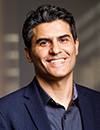Mehdi Nikkhah,
Associate Professor of Bioengineering
Mehdi Nikkhah is currently an Associate Professor of Biomedical Engineering at Arizona State University (ASU). He completed his postdoctoral fellowship training at Harvard Medical School and Brigham and Women’s Hospital. He received his B.S. in mechanical engineering and M.S. degree in biomedical engineering from Tehran Polytechnic University, followed by a Ph.D. in mechanical engineering from Virginia Tech. His research focuses on integrating micro- and nano-scale technologies, innovative biomaterials, and single-cell resolution analysis to better understand the mechanisms of human disease progression and to develop regenerative medicine strategies for treating organ/tissue failure. Dr. Nikkhah has published more than 80 journal articles (over 11,000 citations, H-index of 48), 8 book chapters, and 100 peer-reviewed conference papers, and holds 10 US patents and invention disclosures. His translational research has been supported by multiple federal, state, and local agencies, including NSF, NIH (R01, R21) and Arizona Biomedical Research Consortium. He has received numerous recognitions and prestigious awards throughout his career, including induction into the American Institute for Medical and Biological Engineering (AIMBE) as a Fellow, induction into the National Academy of Inventors (NAI) as a Senior Member, NSF CAREER Award, BMES-CMBE Young Innovator Award, Flinn Foundation Award, ASU Biomedical Engineering Outstanding Assistant Professor Award, and others. Along with his research endeavors, Dr. Nikkhah is very passionate about educating the next generation of students and scholars, with specific attention to minority and underrepresented groups in science and engineering. He has trained more than 75 trainees, including postdoctoral fellows, PhD/MS students, and undergraduate researchers from diverse backgrounds, in his lab.
|

|
